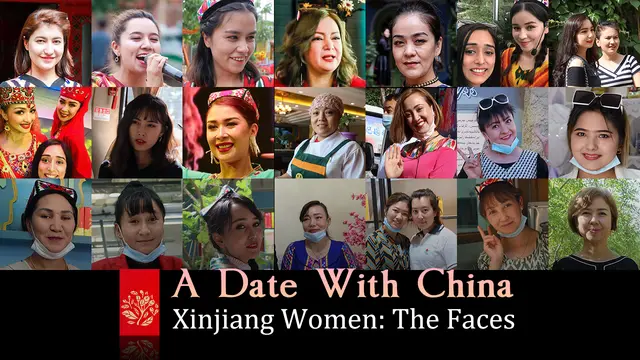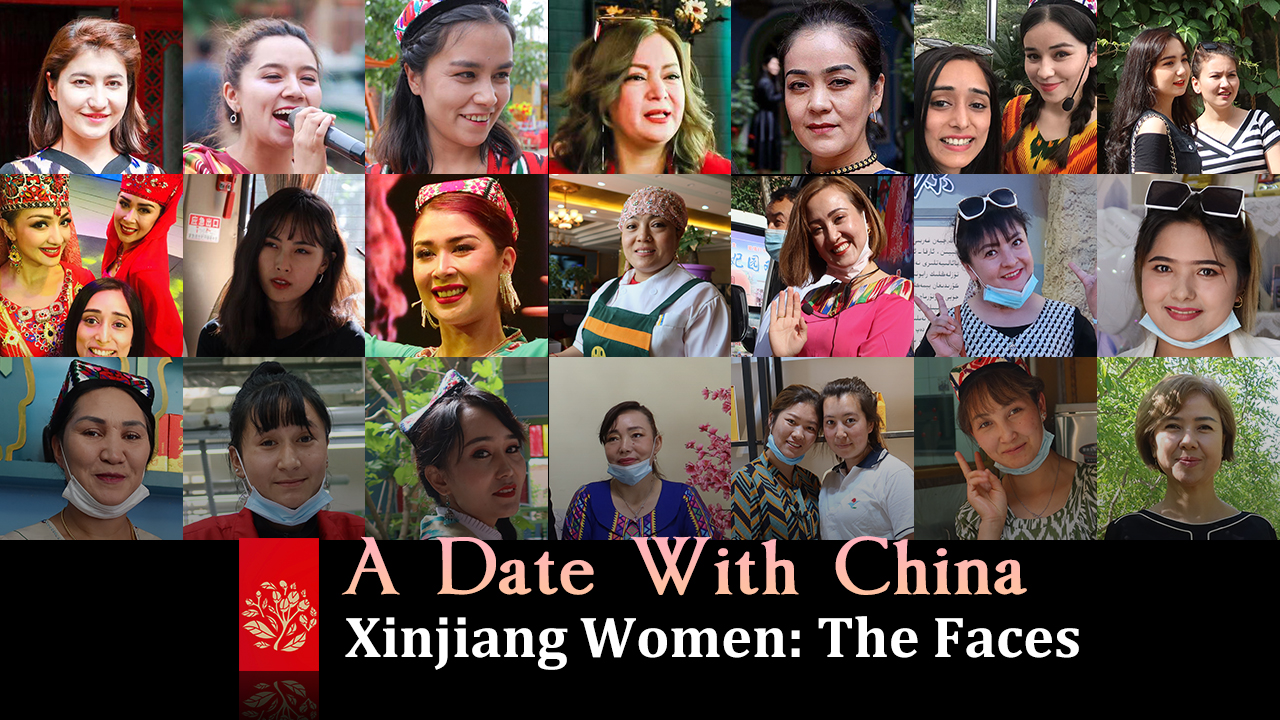
"I am the boss at work and at home," said 31-year-old Salamek, her eyes sparkling with confidence. I met her in Kashgar Old City in Kashgar Prefecture of northwest China's Xinjiang Uygur Autonomous Region. Employed by a culture house called "Gulmahal," her job involves ensuring the tourists get an unabridged Uygur-life experience during their visit.
"Here you can relish a cup of Sut Chai (Uygur milk tea), clad in traditional Uygur attire, and shake a leg to the tunes of dutar, a two-stringed lute, and dap, a frame drum," she explained with an air of professionalism.
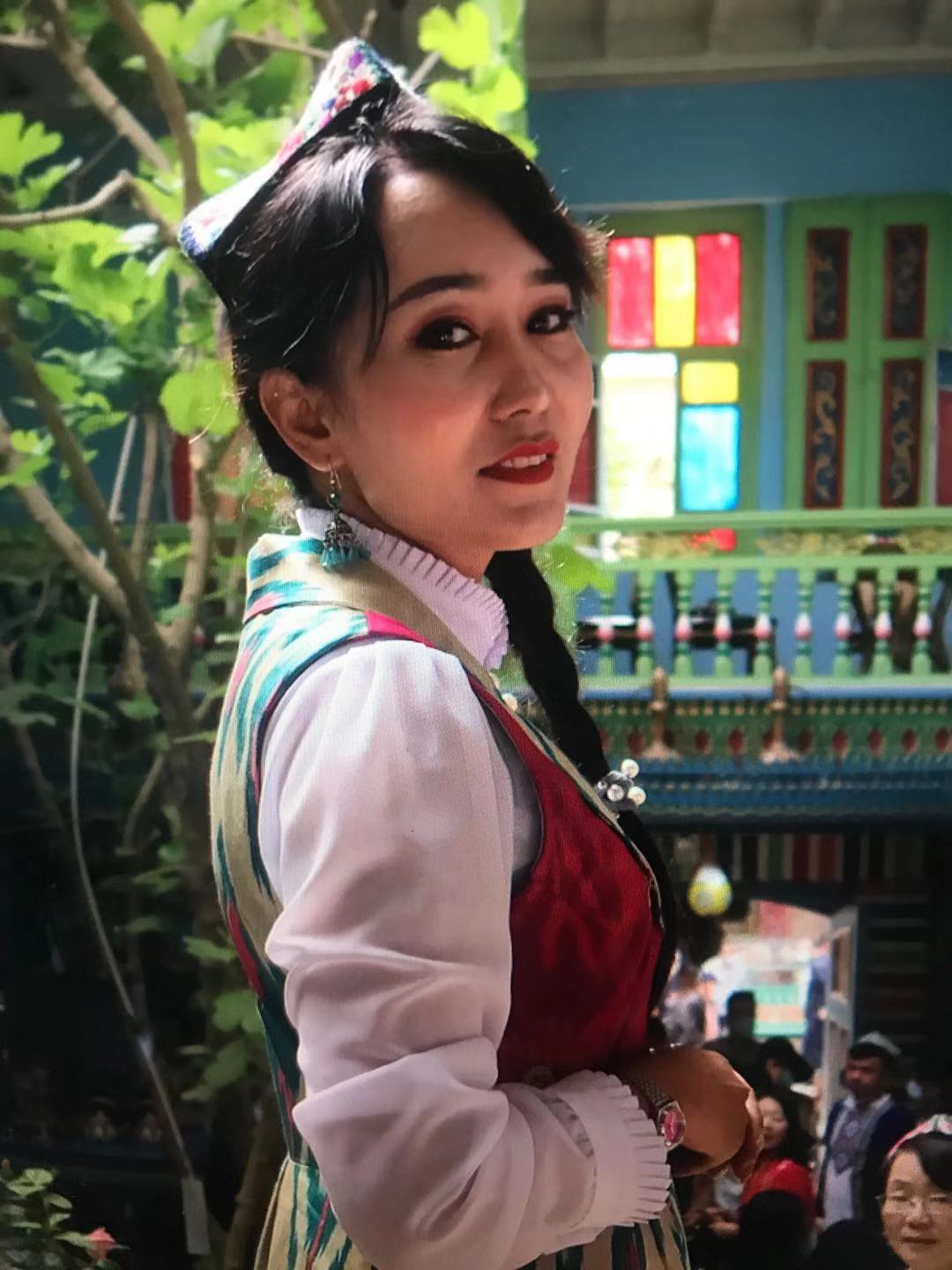
Salamek at Gulmahal in Kashgar Old City in Kashgar Prefecture of northwest China's Xinjiang Uygur Autonomous Region. Khushboo Razdan/CGTN
A mother of three – twin sons and a daughter, Salamek described the policy of free education for all as a blessing. "We don't have to worry about paying hefty school fees. Children enjoy their school till evening and then return home," she told me. "My salary even allowed me to hire a babysitter when they were little, now they are all grown up."
Salamek introduced me to her colleague Gulmira. The 34-year-old mother of two daughters told me that "the perimeter of a woman's freedom generally depends on how 'good' is her life partner."
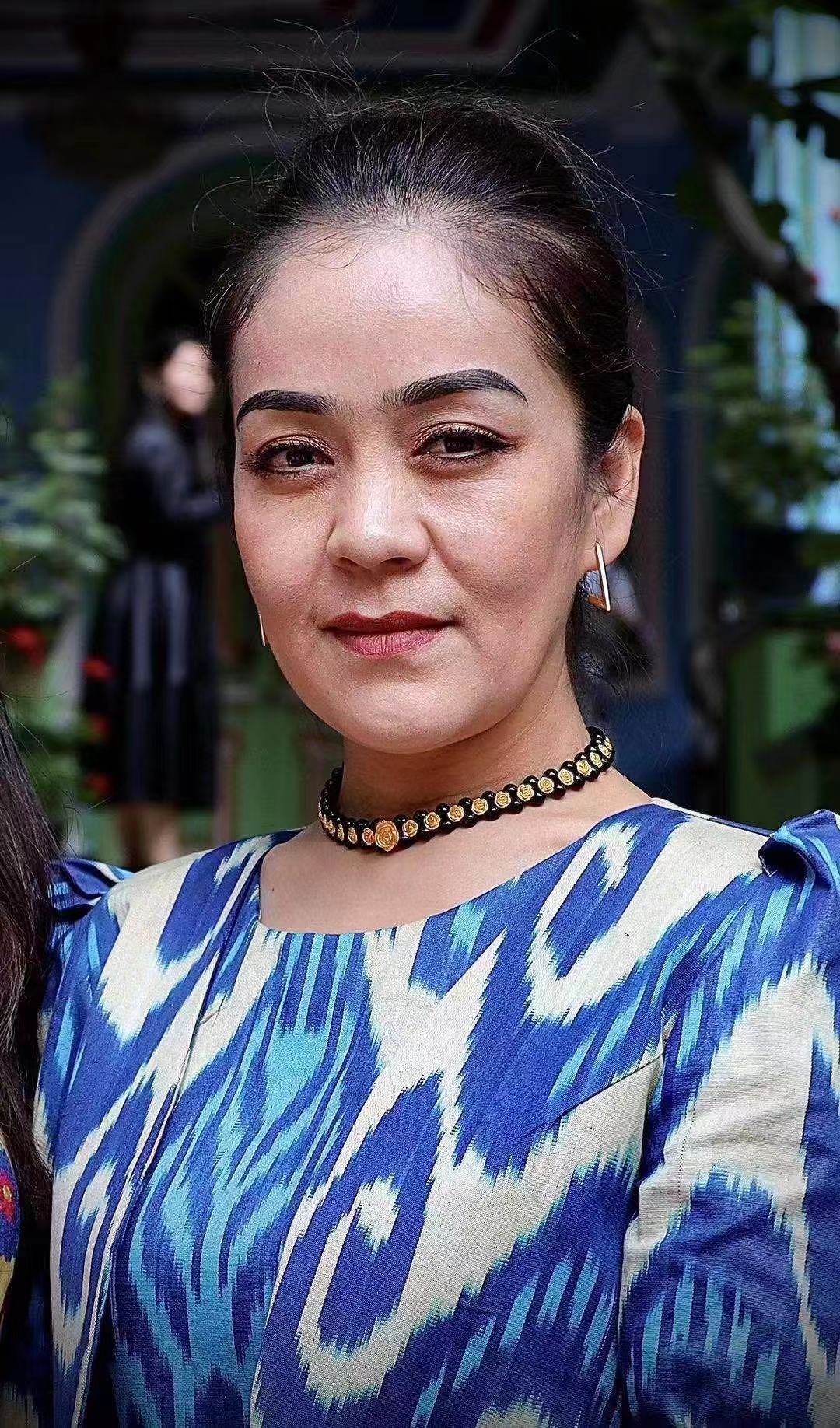
Gulmira at Gulmahal in Kashgar Old City in Kashgar, Xinjiang. /CGTN
"I decide what I would shop and wear, my husband never asks me how I spend my salary," she said, hastening to conclude that she has left it to her husband to take all the other decisions.
Sharing her dreams for her daughters, Gulmira said: "They are studying at a Uygur school. They speak fluent Uygur and Mandarin. I like singing and dancing, but I would want them to pursue their own path."
Forty-two-year-old Maila, who works as an interpreter at a red dates farm in Kashgar's Makit County, also proclaimed her husband the "boss" of the household. "I just worry about how I will spend my salary, everything else is for him decide," she said with a chuckle.

Maila (L) at Achadun Dates Farm in Makit County in Kashgar, Xinjiang. /CGTN
I wondered what local men had to say about this. Just a few blocks away, a local Uygur couple invited me to their house with a wide welcoming smile.
The husband was a farmer who grows corn, wheat and dates while the wife turned out to be a qualified nurse. "She was away for 40 days during the country's fight against COVID," Ismail Ahmed told me with pride.
The wife, who introduced herself as Rehen Gul, jumped in, praising the government for its efficient handling of the outbreak. "We all worked very hard … the government did great," she said.
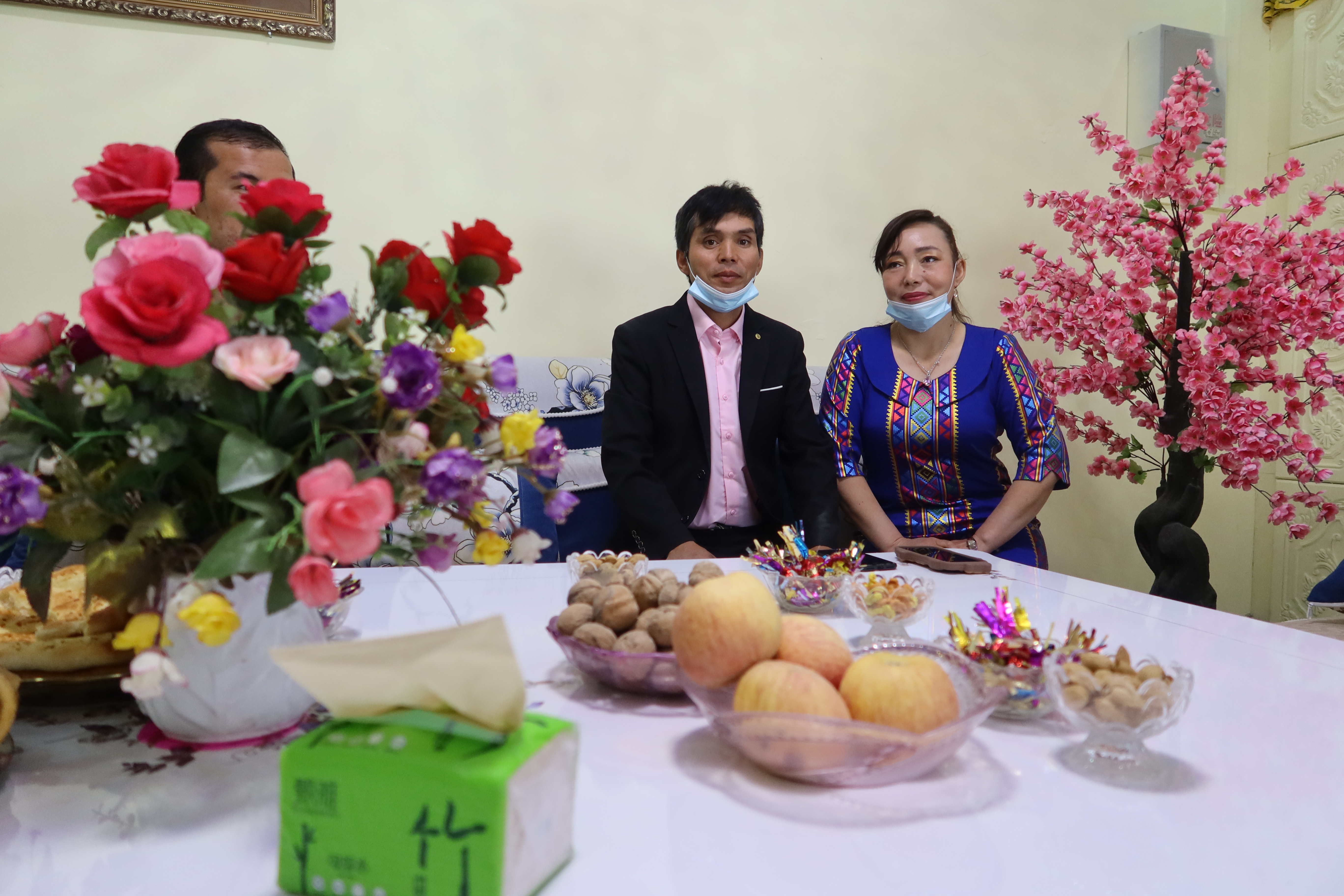
Ismail Ahmed with his wife Rehen Gul in Makit County in Kashgar. Khushboo Razdan/CGTN
The duo, in their early 40s, giggled when I asked who was the boss at home. "Everything is decided during family meetings," they said in chorus, adding "We often cook together."
My quest to better understand the lives of women in Xinjiang took me to Fangjiazhuang Village in Urumqi County.
Thirty-seven-year-old Zhang Yarong is an early riser. She runs a hotel-cum-restaurant in the lap of the majestic Tianshan Mountains. "My day starts with picking fresh vegetables and meat from the market, then I help in cooking, cleaning and customer services," she said.
Zhang, who majored in accountancy, left her job at a bank to start her own business. "My husband and I saw great potential in tourism. The government is helping women like me to grow as entrepreneurs," she noted. "I don't count how many hours I work. I started this place for more income and a better life for my two sons."
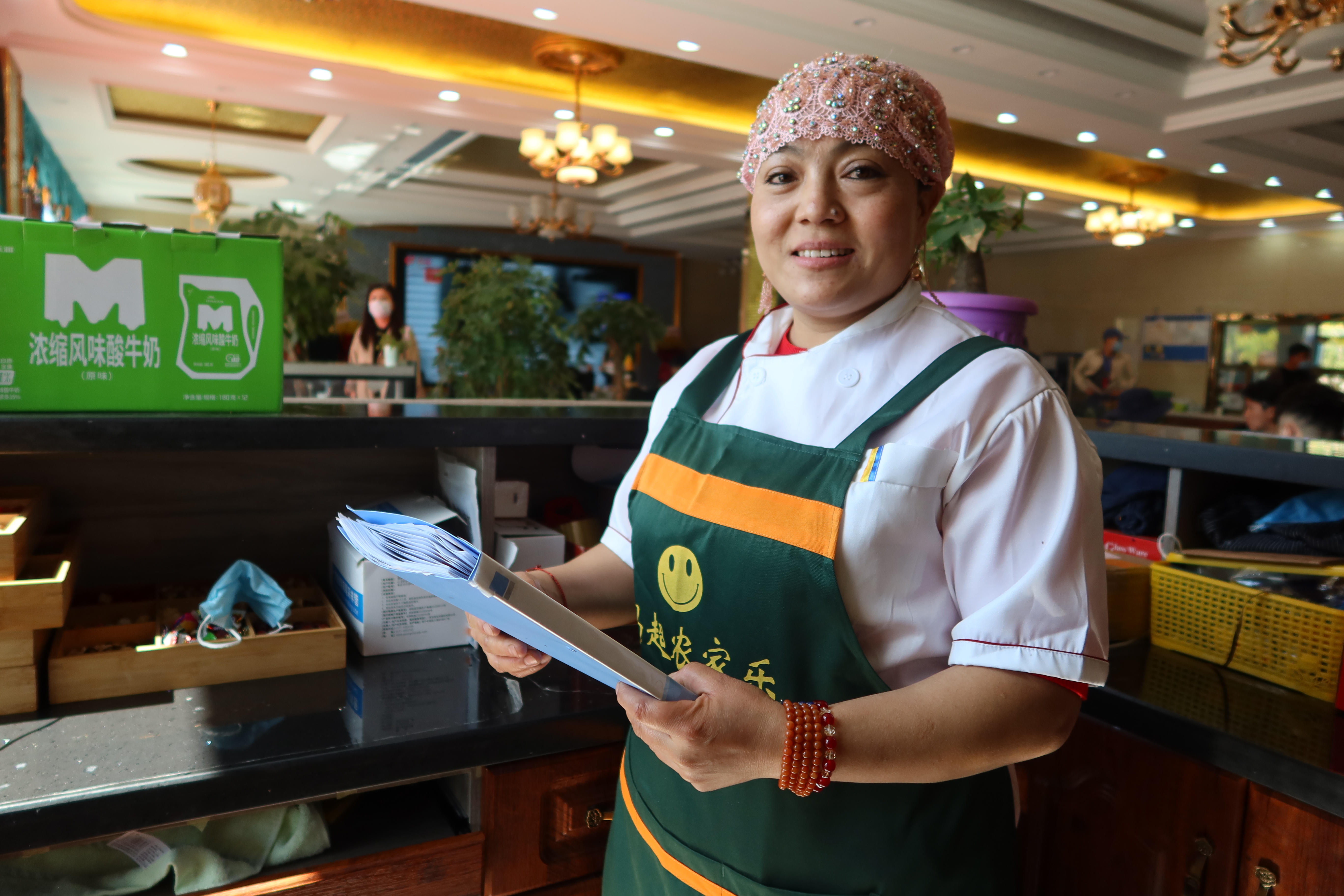
Zhang Yarong at her hotel-cum-restaurant in Fangjiazhuang Village in Urumqi County, Xinjiang. Khushboo Razdan/CGTN
Across the street, I found Peter who owns a Western-Uygur music bar called Raino Restaurant. He told me how his sister Gulbahar chalked out her vision to open a food and music fusion bar. "I instantly liked the idea and decided to act on it."
When I asked him about his wife he said: "She stays at home and takes care of their son," adding "She's free to chase her dreams, but she's yet to decide what she wants to do."
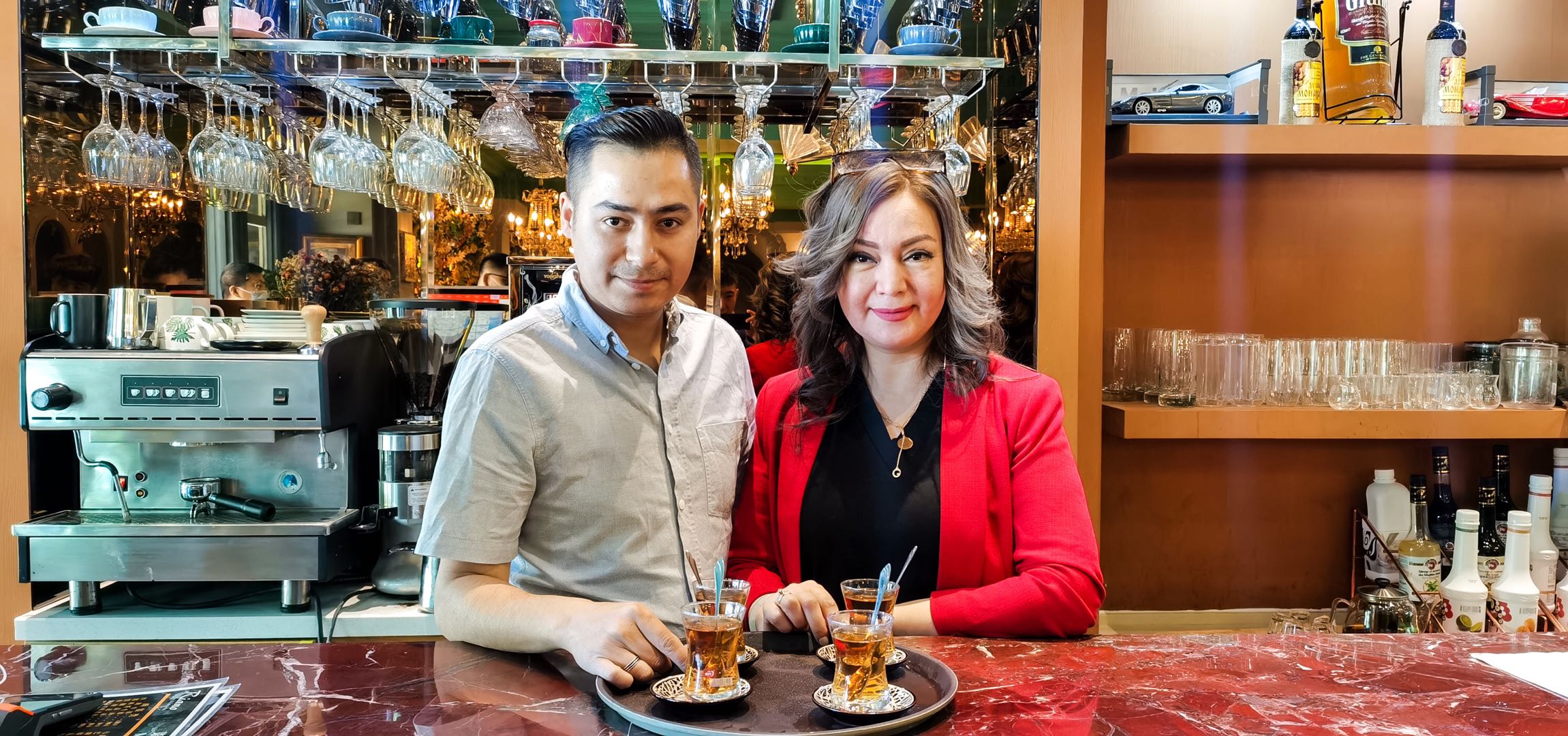
Gulbahar with her brother Peter at Raino Restaurant in Fangjiazhuang Village in Urumqi County, Xinjiang. /Courtesy of "A Date With China"
Helping me navigate through the Uygur language was Gulnar. During our candid conversations over lunch and tea, I got acquainted with her earlier role in implementing the government's women welfare schemes.
She lauded the government for its women empowerment efforts. "My job included convincing older people to allow women to go out and work."
She told me that there have been some rare cases where women who were married off early filed for a divorce after they realized their self-worth. "Free education renders them aware of the Constitution and their rights."

Local women gather at a neighborhood market to enjoy traditional grilled fish in Mixia Town in Shache County, Xinjiang. Khushboo Razdan/CGTN
But Wu Liang, from east China's Jiangxi Province, who has been living in Urumqi since 2014, talked about "peer pressure" to marry.
The 33-year-old works as a manager at Saumersen Resort in Fangjiazhuang Village. "There's no one in the family pushing me to get married, but when I see my friends and cousins settling down I feel the pressure."
Wu told me she was planning to learn the local language and absorb more of the culture to better serve as a rural resort manager. "I love going to the bazaar and practice my Uygur, buy new clothes and try new food," she revealed.
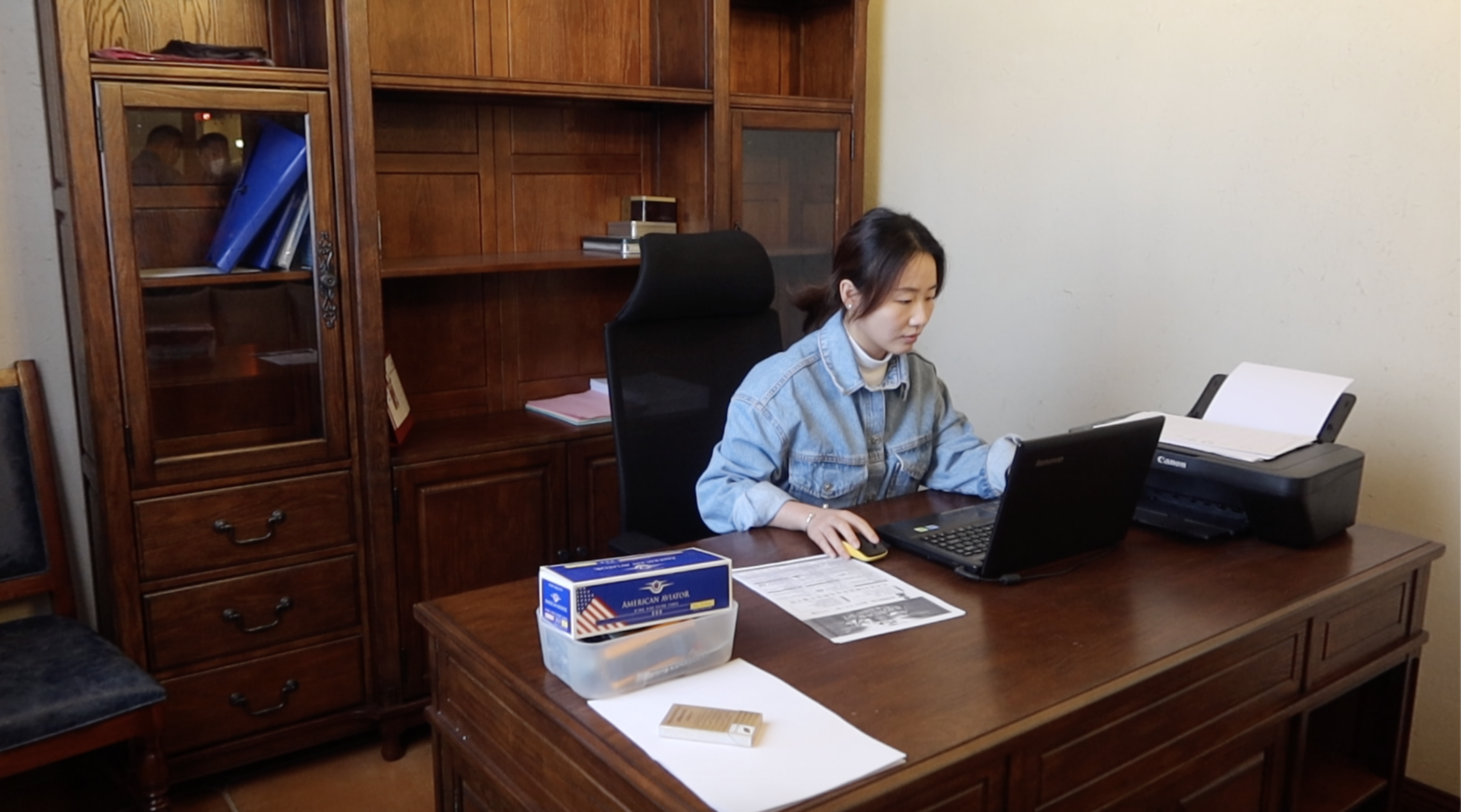
Wu Liang in her office at Saumersen Resort in Fangjiazhuang Village in Urumqi County, Xinjiang. Khushboo Razdan/CGTN
Wang Jinjing, who works under Wu, also agreed to share her story with me. She married her high school sweetheart at the age of 20 and left her previous job at a hotel after embracing motherhood.
Though she does harbour wistful feelings about not pursing further studies, she does not regret temporarily staying at home to nurse her son. "Yes, the money was less, but we were still happy," she grinned.
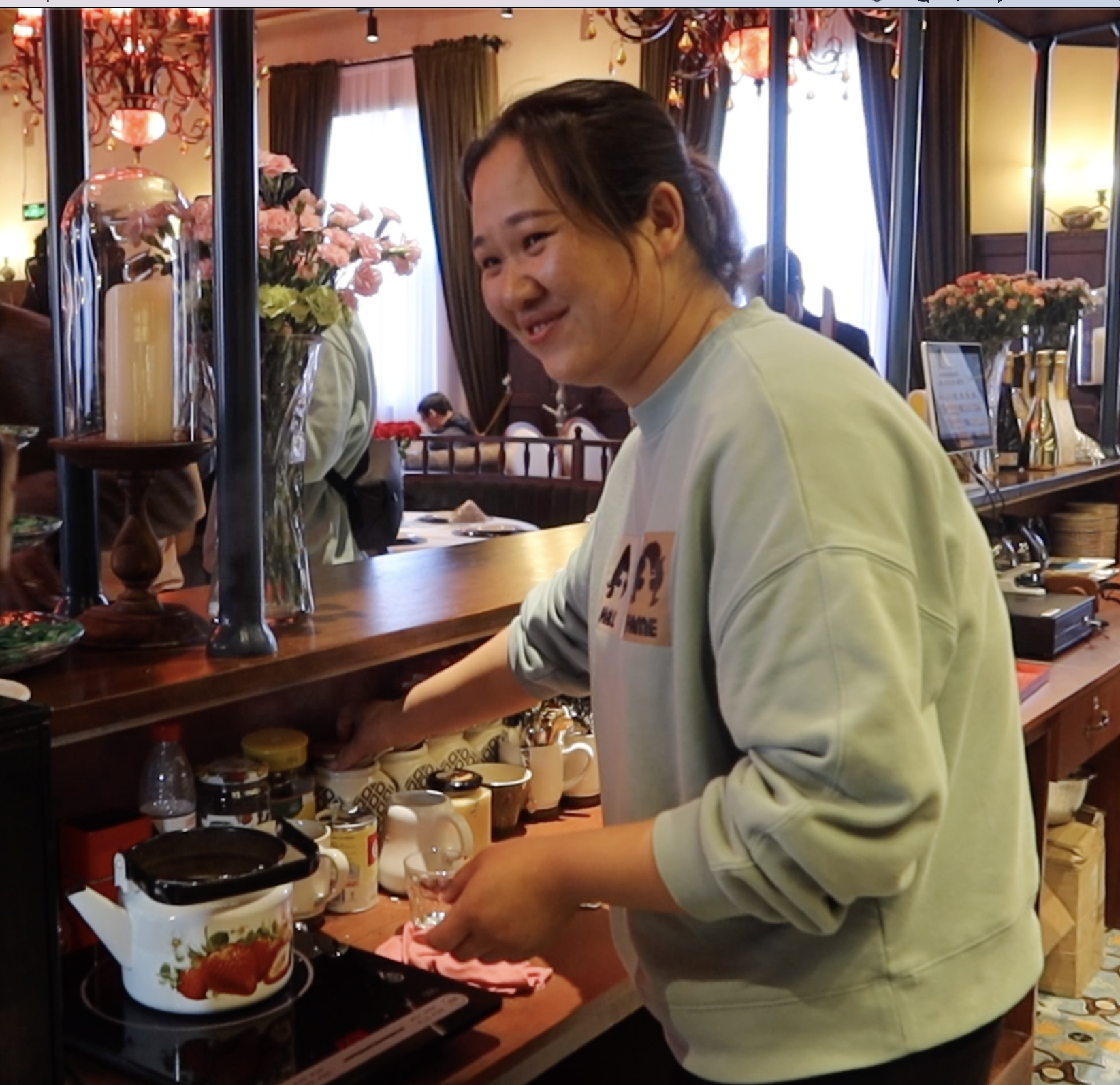
Wang Jinjing prepares traditional Uygur milk tea at Saumersen Resort in Fangjiazhuang Village, Xinjiang. Khushboo Razdan/CGTN
My next stop was Shache Country. Rambling in the Jayterek Street for Entrepreneurship and Employment, a hair salon adorned with red faux flowers caught my eye.
The proprietor named Tursun donned a bright yellow pencil dress with high heels and a pair of wide frame sunglasses perched on her head. "I feel liberated in trendy dresses, coverings are for the old people," she laughed as I complimented her personal style.
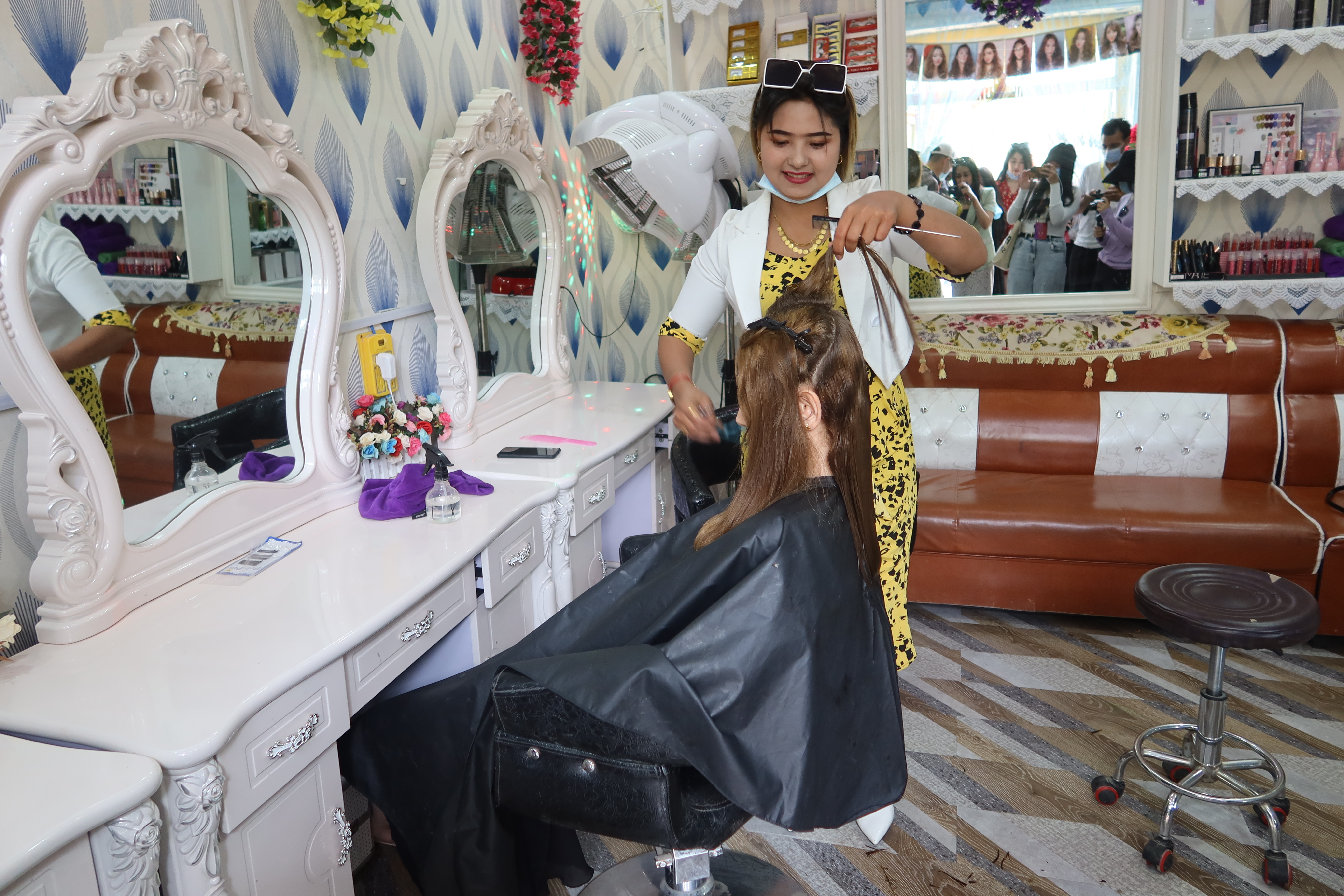
Tursun at her hair salon on Jayterek Street for Entrepreneurship and Employment in Shache County, Xinjiang. Khushboo Razdan/CGTN
She politely asked her client to wait as she accepted my request for an interview. "I learned hair dressing at a vocational school and opened the parlor with help from the government's interest-free loans scheme for women," she said.
Talking about her life as a working mother she said the free kindergarten was her lifeline. "I drop my son at the kindergarten at 9:30 every morning and then come straight to work, in the evening my husband takes charge of the kitchen and the kid."
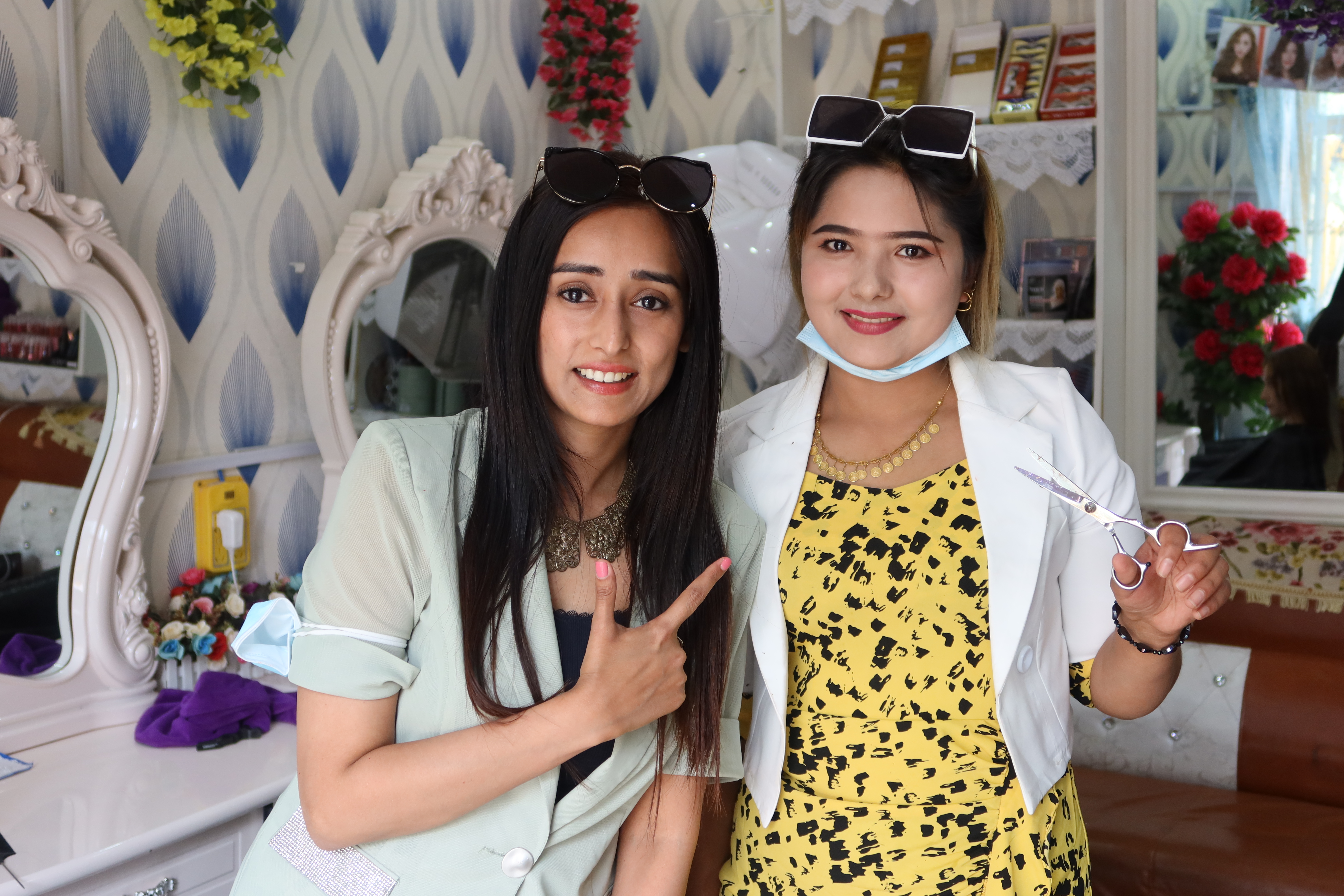
Tursun (R) posed for a picture with me at her hair salon. /CGTN
I concluded my trip with a visit to an electronics factory in Hotan Prefecture where I met 23-year-old Gulinar. A die-hard Bollywood fan, Gulinar blushed as she whispered Shah Rukh Khan was her favorite movie star.
Employed and trained on the job, she told me: "Women workers are entitled to free breast cancer insurance and paid menstrual leave."

Gulinar at an electronics factory in Moyu County in Hotan Prefecture, Xinjiang. Khushboo Razdan/CGTN
 简体中文
简体中文

